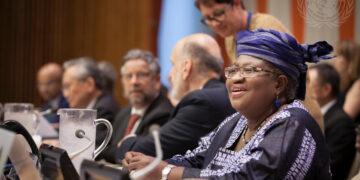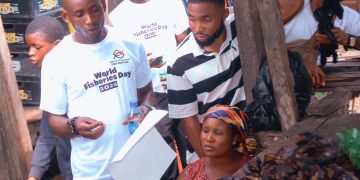The World Trade Organisation, on Tuesday, said Nigeria had relinquished its leading position in the agriculture export market because a lot of its agricultural commodities do not meet the sanitary and phytosanitary measures required for exportation.
It also pointed out that despite the abundance of arable lands and increased investments, the nation has transitioned into a net importer of farm produce that was previously cultivated domestically, undermining efforts aimed at ensuring food sustainability.
The Director General of the World Trade Organisation, Ngozi Okonjo-Iweala, disclosed this at the launch of seven trade support programmes initiated by the WTO-ITC to boost the development of Nigeria’s trade and industry standards in Abuja.
The initiatives namely the Standards Trade Development Facility, Digital Trade Initiative support, Women Exporters Entrepreneurship support, National Trade Portal and cotton development initiative aim to provide technical support to strengthen food safety, animal and plant health capacity in developing countries, address challenges of e-commerce digital trade divide and establish a world-class technology centre for all trade-related data and information in Nigeria.
She said, “We are launching today with STDF, ITC, and the NEPC, a project to help with international safety and quality certification for sesame and cowpeas or black-eyed peas.
“The agriculture sector in Nigeria has the potential to be a major driver of export diversification and job creation – but too much of this potential remains unrealised, due to a variety of barriers.
“In fact, Nigeria has not only lost out in agricultural export markets, it is a net food importer spending about billions a year on goods, many of which we can also produce here.
“Some of Nigeria’s unrealised potential has to do with trade-related problems on the supply side – and that is what this project is seeking to rectify.”
Specifically, the WTO DG mentioned that Nigerian cowpea and sesame exports have increasingly faced rejections in several destination markets due to non-compliance with international SPS requirements.
She said the failure to comply with regional, global and import country sanitary and phytosanitary standards has resulted in loss of sales, revenue, and hard currency due to export rejects.
Last week, the former finance minister charged Nigeria and other African countries to improve the quality of their shea exports to international standards.
She added, “Nigeria is the world’s largest producer and consumer of cowpeas. Sesame is primarily an export crop, and Nigeria is the world’s fourth leading producer, exporting to the EU, Türkiye, Japan, South Korea and other Asian markets. However, Nigerian cowpea and sesame exports have increasingly faced rejections in several destination markets due to non-compliance with international SPS requirements”.
She said for example, “Nigeria accounts for over a third of Japan’s sesame imports – but health and safety inspections during the past few years have found instances where pesticide residue levels were nearly double the maximum residue limits permissible from 2019 to 2021.”
To tackle the challenges, Okonjo-Iweala noted that WTO is partnering with relevant stakeholders to build the capacities of stakeholders across the sesame and cowpeas value chains to better understand market access requirements and improve agricultural practices such as pesticide application, hygiene techniques, harvest and post-harvest methods, and food safety.
She said the project which will be implemented with $1.2 million funding will improve the country’s non-oil export.
On her part, the Minister of Industry, Trade and Investment, Doris Aniete, said the ministry is putting in place policies and mechanisms that will facilitate and enhance trade, while also removing all the bottlenecks hampering trade and investment.
She further stated that the Ministry has started rolling out the 50 Billion Naira Presidential Conditional Grant Scheme through the Bank of Industry, targeting various economic players adding that an N150bn intervention through the FGN MSME and Manufacturing Sector Funds, providing low-interest loans that are pivotal for scaling businesses and spurring job creation will commence very soon.
“We are achieving this by facilitating a strong enabling environment for businesses to thrive, developing robust policies and reforms, increasing access to financing, widening access to global markets, driving investments, and creating job opportunities, all in line with the vision of Mr President.
“In 2024 we are focused on improving infrastructural capacity such as power and transport, as well as soft infrastructure such as transparent regulation, policy consistency, the rule of law, and a culture of efficient collaboration and synergy among various government agencies and offices. We believe this will facilitate an environment where business operations are not hindered by red tape but can continue to thrive,” she said.
Also speaking, the Executive Director of the Nigerian Export Promotion Council, Nonye Ayeni, explained that the project expected to last for three years will enhance the quality and standard of sesame and cowpea through the institution of good Sanitary and Phyto-sanitary conducts.
She disclosed that in 2022, the worldwide value of sesame exports and its value chain amounted to $7.35bn, projected to surge to $9.27bn by 2032. Similarly, cowpeas were valued at $7.2bn in 2023, with an anticipated rise to $9.43bn by 2028.
“This project, STDF 845, will therefore enhance the quality and standard of sesame and cowpea through the institution of good Sanitary and Phyto-sanitary conducts, Good Agricultural and Warehousing Practices, packaging/labelling and excellent storage systems. All these are expected to forestall frequent contract cancellations and loss of business opportunities while allowing a significant increase in global acceptance of the items and for better quality of these products consumed locally
“This project is designed to last for three years to enhance the integrity of the cowpea and Sesame value chain from Nigeria. Therefore, the focus lies on improved practices that will enable Nigerian stakeholders to comply with Maximum Residue Levels of selected pesticides used in Cowpeas and Sesame and Microbiological contamination with Salmonella (Sesame). Overall, it will improve the regulatory and control system as well as farming and processing practices applied for Cowpea and Sesame,” she concluded.
Read original article on Punch
























